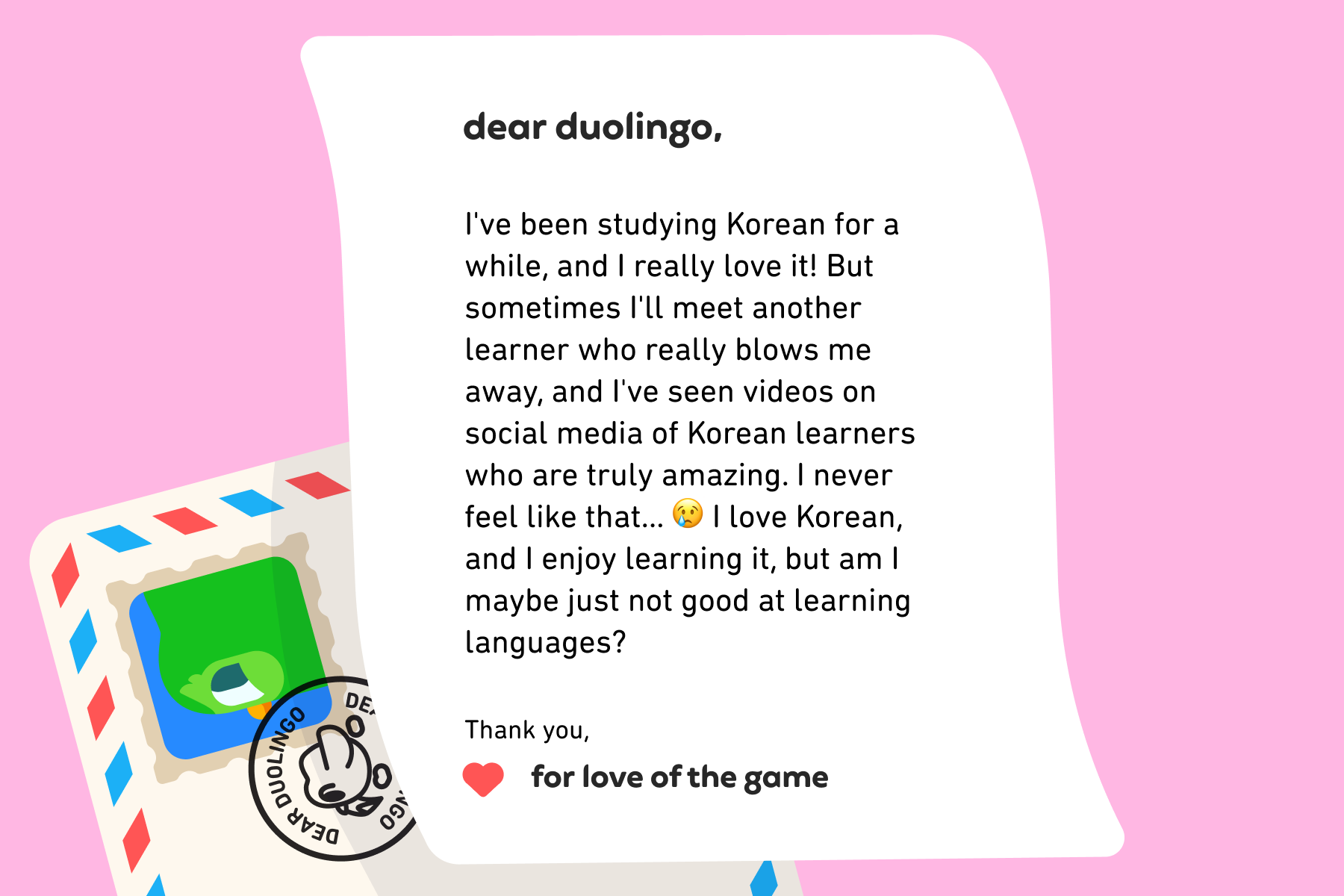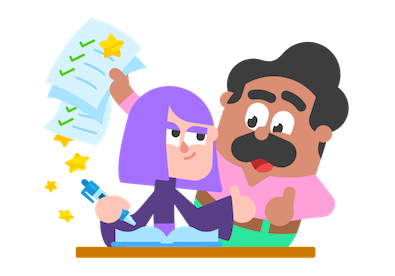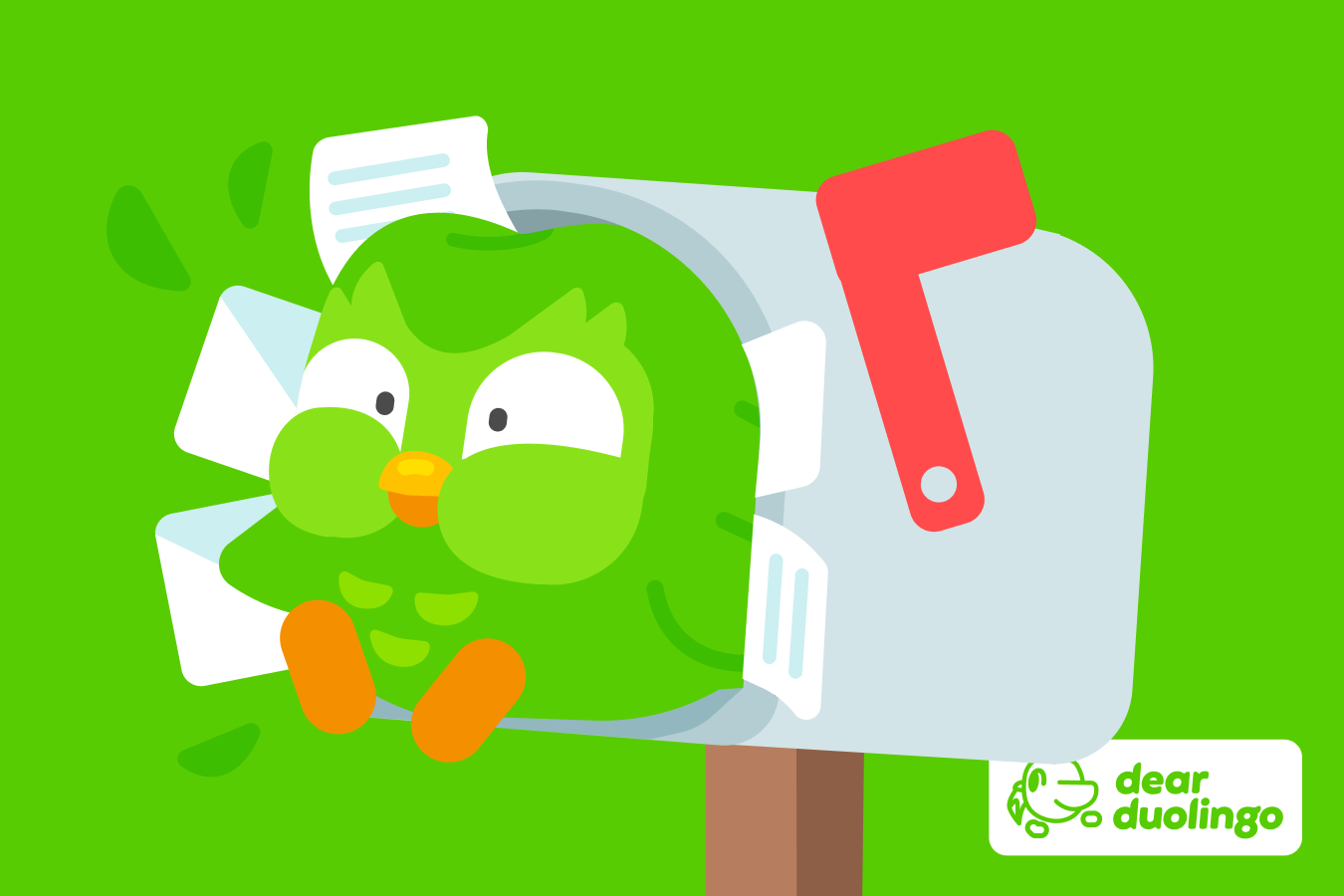Welcome to another week of Dear Duolingo, an advice column just for language learners. Catch up on past installments here.
Hi there, learners! This week I’m teaming up with Dr. Adele Touhey, a former Chinese instructor (ask her about Chinese tones!) to combine our experiences teaching very different languages to hundreds of university learners. We’ve seen language learning on a scale most individual learners don’t get to see—so we have a lot to say in response to this week’s question!
Our question this week:

Oh, it makes us so happy that you are enjoying learning so much! 💚 And you’re not alone… we hear this question from learners all the time! Learning a language is harder than people realize (even if they love it!), and so much of the journey happens behind the scenes. It’s easy for people to feel like *they* are bad at languages, when in fact, languages are just hard.
This is especially true for adults: We have busy schedules, often can’t run off and immerse ourselves in a community that speaks the language… and we’re terribly hard on ourselves. 🥺 Learners can feel pressure to “become fluent,” even though that’s a murky goal that’s bound to make you feel bad, and there’s a lot of misinformation out there about how to learn a language and what language learning really looks like.
If you’re 30 years old, consider how much you’ve used your first language so far in your life: maybe you’re awake ~16 hours/day, which is 960 minutes/day… times 365 days/year for 30 years… for 10 million minutes of awake time. If you use your language in some way (like reading or speaking it) for half of the minutes you’re awake, that’s 5 million minutes of exposure! Now, here you are learning a new language. 😅 It’s hard to catch up to that 5-million-minutes head start!
And actually, comparisons might be bad altogether. Here’s what goes into making someone a good (or bad) language learner.
What influences how well you learn a language?
There are a lot of factors that matter and they all interact. A learner may have advantages in one respect, but be challenged by another, and certain combinations make learning a new language even more challenging (or perhaps much easier!).
Here are some of the most important factors:
- Age. Age plays a role in language learning for sure, but it’s not always for the reasons you think! In general, though, younger learners tend to have an easier time than older learners.
- How different your languages are. If the language you know best is similar to the new one you’re learning, you might have an easier time learning it (at least at the start!).
- Whether you know other languages. If you already know multiple languages, you’ll likely have an easier time learning still more languages!
- How much time you study. Unsurprisingly, for most people, the more time you can dedicate to studying and practicing the language, the more you’ll learn!
- How you study. How you spend your time matters, too, and interacting with the language—especially in lessons and ways that feel challenging—will be more effective than doing an old review lesson while listening to Dua Lipa and talking to your roommate about the new Barbie movie 😬
- How often you study. It doesn’t just matter how much you study, but how often you study: Practicing your language one hour a day leads to better learning than cramming 5 hours once a week. This is due in part to our brain’s need to consolidate memories with sleep, and it’s also because repetition spaced out over time helps build strong connections in the brain.
- Whether you push yourself to do the hard things. The best learning happens when you are at the cusp of your current knowledge, and doing things that feel a little hard—whether that’s continuing down the Duolingo path or following social media accounts that post in the language. This is true of your language skills, too: For example, speaking and listening in real conversations often feels the scariest, but the more you do it, the more you’ll learn!
- Aptitude. Yes, there are some differences in how quickly or effectively people learn new languages—but most variation among most learners has more to do with the above factors than with aptitude!
When you look at how these factors affect learning outcomes, it should become clear that it is not that you are bad at learning languages! Fortunately, a lot of those factors, like how often you study and how you study, you have a lot of control over. That means you have the power! So much of learning a new language successfully is about putting in the time, for a long time, and finding ways to use the new language whenever you can—and that can include listening to music in the language, watching TV and movies (including anime), changing the language of your phone, adjusting the settings on your favorite video games, listening to podcasts, and finding ways to stick with it. The power really is yours!
And for the factors you can’t really control? Set realistic, personal goals that help you see your progress a little at a time, and change your expectations about what is possible, and even necessary, based on the time and resources available to you.
So why do people feel they’re “bad” at learning languages?
One reason is because mistakes are necessary for learning, whether you learn a language on Duolingo, take an ice skating class, or perfect a TikTok dance. Mistakes are so normal! It would be amazing (and also strange) if you tried something totally new and were just great at it. Could you pick up a flute and just suddenly… play a whole song? Jam with Lizzo? Of course not, and probably not even after a year—but learners sometimes feel like they should pick up a language effortlessly, or that the mistakes they make are their “fault.” But language learners at all levels, using all methods (including learning a language abroad or with a private tutor), make mistakes. Even life-long speakers have slips of the tongue!
Making mistakes can feel frustrating, especially at the beginning when there’s just so much to figure out, and for self-guided learners like many of you studying on Duolingo, making mistakes can feel lonely. If you’re learning alone, you might not see how many millions of other learners are making the same kinds of mistakes, but as former university language instructors, Adele and I have seen whole classes of learners make the same patterns of mistakes. (Interested in learning more about mistake patterns in language learning? Let us know!)
This is why the Duolingo course has a lot of different kinds of practice available to you. (And it’s also why the heart system helps slow you down a bit and encourages review when the content might be too challenging.) By revisiting mistakes at the end of a lesson, you get a chance to see the information again, make a correction, and strengthen your memory of the pattern.

Another big reason people can feel like they aren’t good at languages is because it’s uncommon to see real examples of learning. Unless you are interacting with other learners, in the language you’re learning, you probably won’t see what real language learning looks like. If you follow super polyglots on social media (and there’s plenty of them), you might only be seeing the end result of studying a 4th (or 7th, or 12th) language. Not to mention many of those exceptional polyglots truly are exceptional: They spend their entire days studying and practicing, communicating non-stop, often living in a place where they can practice the language with others. (Jealous!!)
But what rarely gets as many views is someone authentically learning a second language, for the first time, at that very moment. So comparing your learning journey with that of an accomplished polyglot influencer—or even just with someone who’s been hard at work for years—is bound to leave you feeling inadequate. Typical learners have just a little time a few days a week to dedicate to a language, while spending the rest of their time living life in their first language. It’s no surprise that the results look different!
Learning a language is hard *and* amazing!
You’re doing a hard thing, and you’re probably doing the best you can given your time, resources, and your whole life! Developing good study habits, finding practice opportunities, and sticking with it will influence your success more than the mostly minor differences in our natural aptitudes. Take a moment to recognize how impressive you are!
For more answers to your language and learning questions, get in touch with us by emailing dearduolingo@duolingo.com.



